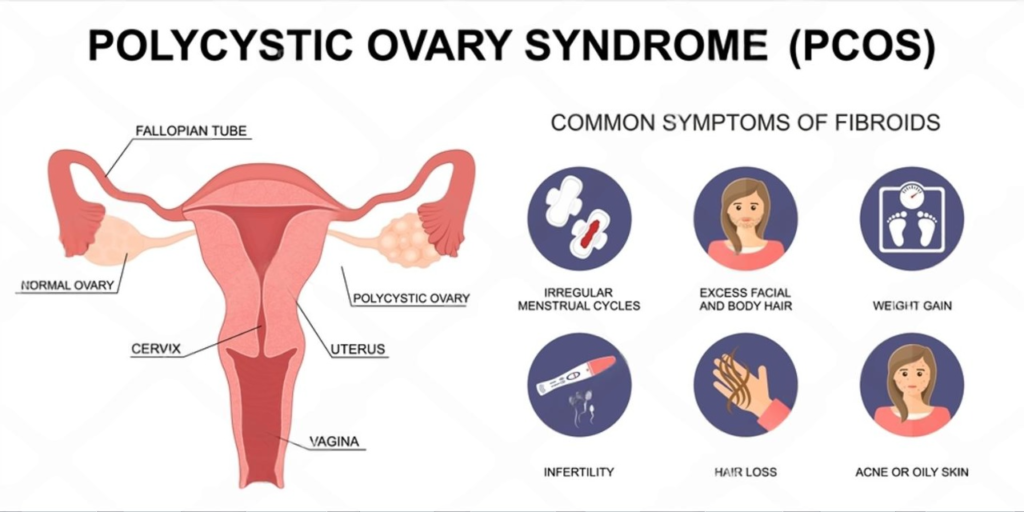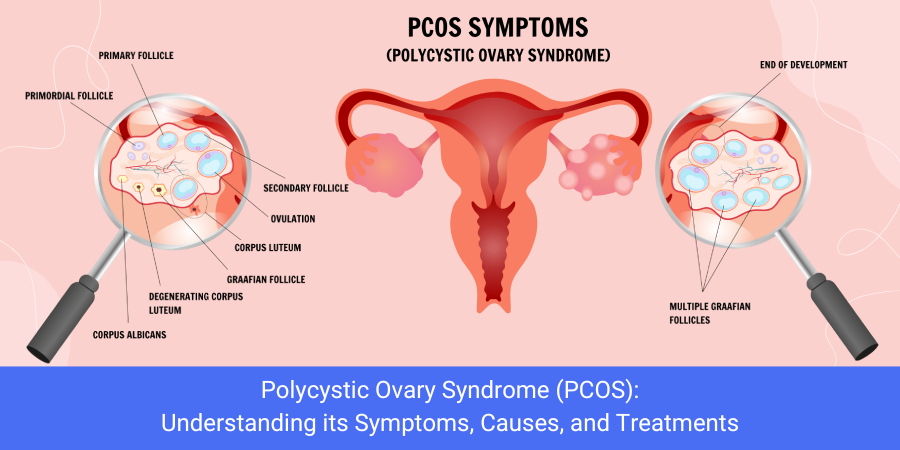Understanding PCOS (Polycystic Ovary Syndrome)
PCOS, or Polycystic Ovary Syndrome, is a common hormonal disorder affecting women of reproductive age. It can cause irregular periods, excess androgen levels (male hormones), and cyst-like follicles on the ovaries. PCOS may affect fertility and can have long-term health impacts if left unmanaged.

What to Expect During Diagnosis & Treatment
Initial Consultation: A detailed medical history and physical exam will be conducted. You may be asked about your menstrual cycle, weight changes, acne, hair growth, and family history.
Tests: Blood tests are done to assess hormone levels. An ultrasound may be recommended to check for ovarian cysts.
Treatment Options: PCOS is managed through lifestyle changes, medications (like birth control pills or insulin sensitizers), and sometimes fertility treatments if conception is a goal.

Common Symptoms
- Irregular or missed periods
- Excess facial or body hair (hirsutism)
- Acne or oily skin
- Weight gain or difficulty losing weight
- Thinning scalp hair
- Difficulty getting pregnant
- Darkening of skin (especially around neck or groin)
Benefits of Early PCOS Management
- Regulates menstrual cycles
- Improves skin and hair conditions
- Helps with weight management and insulin resistance
- Enhances fertility and ovulation
- Reduces risk of diabetes and heart disease
- Improves emotional wellbeing and mental health
Who Should Seek Help?
PCOS affects 1 in 10 women of reproductive age. If you experience any of the following, it’s time to see a gynecologist or endocrinologist:
- Irregular or absent periods
- Unexplained weight gain
- Unwanted facial/body hair growth
- Acne that doesn't respond to skincare
- Difficulty conceiving
Prevention & Lifestyle Management
Diet: Choose whole foods, low-glycemic index carbs, and anti-inflammatory meals.
Exercise: Aim for at least 30 minutes of physical activity 5 times a week to improve insulin sensitivity and maintain a healthy weight.
Sleep & Stress: Prioritize 7–8 hours of sleep and manage stress with mindfulness, yoga, or therapy.
Testimonials
"I was struggling with irregular periods and acne. After my PCOS diagnosis and proper treatment, my cycles normalized and I feel healthier than ever." – Nikita J.
"The guidance I received during my PCOS journey helped me lose weight and conceive naturally. I’m so grateful for the support!" – Deepika V.
Frequently Asked Questions
Is PCOS curable?
PCOS is a lifelong condition, but its symptoms can be effectively managed through lifestyle changes, medications, and regular monitoring.
Can I get pregnant with PCOS?
Yes, many women with PCOS conceive naturally or with the help of fertility treatments. Early diagnosis and hormone regulation can increase chances.
Does PCOS go away after menopause?
While ovulation-related symptoms may ease, PCOS doesn’t go away entirely. Risk factors like diabetes or heart disease may still remain, making continued care essential.
How does PCOS affect mental health?
Hormonal imbalances can contribute to mood swings, anxiety, and depression. Seeking mental health support is an important part of PCOS care.
Contact Dr. Rainee Agrawal
For expert diagnosis, lifestyle support, and personalized PCOS management:
Contact Us+91 9179559565
Contact Person: Dr. Rainee Agrawal

